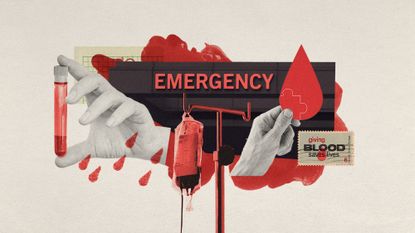Universal donor blood is 'close' to reality
Scientists identify 'cocktail' of enzymes that destroy harmful antigens

(Image credit: Illustration by Julia Wytrazek / Getty Images)
BY REBECCA MESSINA, THE WEEK UK
Attempts to create universal donor blood have taken a "decisive step forward" after scientists discovered ways to significantly reduce the risk of a negative reaction.
A "cocktail" of bacterial enzymes identified by researchers at the Technical University of Denmark (DTU) and Lund University in Sweden effectively removes antigens, according to findings published in the scientific journal Nature Microbiology.
Around 50% of people naturally have type O or "universal" blood, but those with type A, type B and the rarer type AB blood can currently only give and receive blood from their own group. This is because antigens, the chains of sugars attached to the body's red blood cells, take on different forms in type A and type B blood and can "trigger life-threatening immune reactions when transfused into non-matched recipients", DTU said in a press release.
Scientists have "experimented with enzymes" to remove antigens from blood for decades, said The Economist. But the new combination appears to be effective on "lengthened antigen sugar chains, called extensions, that are not targeted by current enzymes".
"We are close to being able to produce universal blood from group B donors, while there is still work to be done to convert the more complex group A blood," said Professor Maher Abou Hachem, who led the study.
The research team will work on the project for another three and a half years, after which they hope to progress to human clinical trials.
The ability to convert donor blood into a universal type would "markedly reduce the logistics and costs currently associated with storing four different blood types", said DTU.
Every drop counts. Blood banks have warned of dwindling supplies in countries including the US and UK, and "ageing populations are expected to increase the demand for blood yet further", said The Economist.
No comments:
Post a Comment